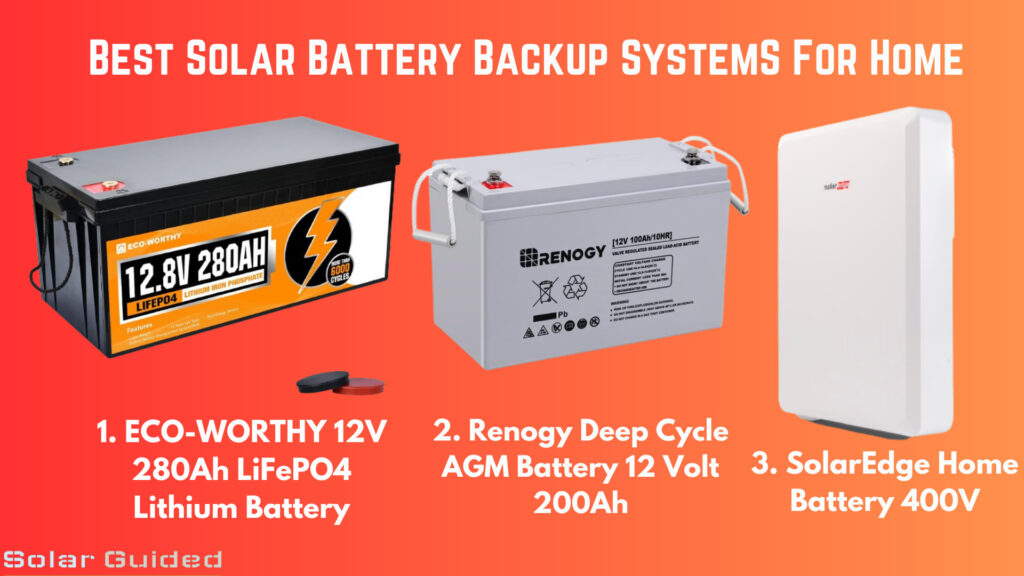
Best Solar Battery Backup System For Home
In an era where sustainability meets the warmth of home! Sun power is used not just to light up your living space but also to keep it buzzing with energy when you need it most.
As homeowners increasingly seek ways to reduce their carbon footprint and gain energy independence, the spotlight falls on solar battery backup systems. These innovative technologies not only capture the sun’s abundant energy but also provide a reliable and efficient means to store it for later use.
This article is about the Best Solar Battery Backup System For the Home.
What Is A Solar Battery Backup System?
A solar panel battery backup system is a system in which the energy generated during daytime by the solar panels is stored in the batteries and utilized during nighttime when sunlight is unavailable. If your solar panels absorb the sun’s rays during the day, generating more energy than you need, Instead of letting that excess energy go to waste, a solar battery backup system comes into play.
This innovative technology allows you to store that surplus energy for a rainy day or nighttime.
How Are Solar Batteries Useful?
When the sun takes a break, or if you have a power shortage your solar battery kicks in. It becomes your energy reservoir, providing you with the stored power you need to keep your lights on, and devices charged, and utilize the appliances.
A solar battery backup system is your secret weapon against energy shortages and interruptions. It’s a smart, eco-friendly way to make the most of the sun’s generosity and ensure your home stays powered up whenever you need it, day or night.
How many days can these Solar Batteries Power Last?
The number of days a solar battery can power a home depends on its capacity, daily energy consumption, and sunlight availability, typically one to several days. For extended autonomy, consider larger battery capacities and efficient energy usage.
Pros And Cons Of Using Solar Batteries For Backup:
| Pros of Solar Batteries | Cons of Solar Batteries |
|---|---|
| Energy Independence: Allows greater control over energy consumption, reducing dependence on the grid. | Initial Cost: Installation expenses may discourage some homeowners. Long-term savings should be considered. |
| Reliable Backup Power: Acts as a resilient backup during blackouts, ensuring uninterrupted operation of essential devices. | Limited Lifespan: Batteries have a lifespan of commonly 2 to 5 years, requiring eventual replacement and additional costs. |
| Economic Savings: Storing surplus solar energy leads to reduced reliance on grid power and long-term cost savings. | Space Constraints: Larger battery systems may demand significant space, posing challenges for limited space. |
| Environmental Sustainability: Facilitates the use of clean, renewable energy, reducing the carbon footprint. | Efficiency Loss: Some energy loss during storage and retrieval, resulting in slightly lower overall efficiency. |
| Grid Support and Stability: Supports power grid stability by storing and releasing energy strategically. | |
| Consistent Power in Adverse Conditions: Ensures a reliable power supply even during stormy weather. |
Difference between Solar Batteries and UPS Batteries:
Here are the key differences between Solar Batteries and UPS Batteries:
- Solar Batteries: Specifically designed for storing energy generated by solar panels during periods of sunlight. They allow homeowners to use solar power during the night or on cloudy days.
- UPS Batteries: Designed to provide short-term power backup during electrical outages, allowing for a seamless transition to an alternative power source until the main power supply is restored.
Best Solar Battery Backup System For Home
Below I have reviewed the top five batteries that you can buy for your home so you can keep your home power 24 hours a day, whether it’s raining or blackout you won’t run out of power and your home will be lit up.
1. ECO-WORTHY 12V 280Ah LiFePO4 Lithium Battery:
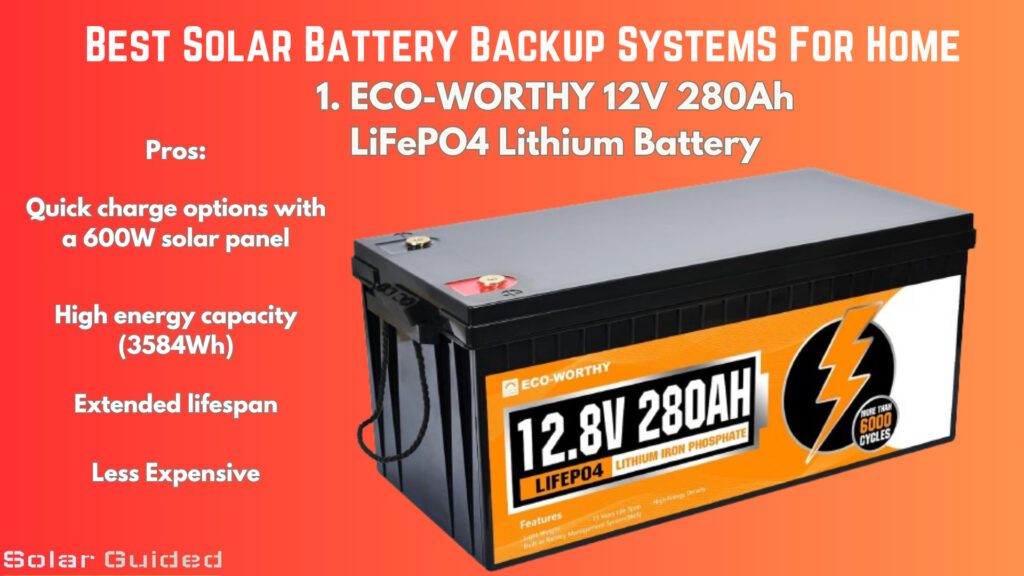
ECO-WORTHY 12V Life Po4 Battery Review:
Here is the best affordable and simplest battery the “ECO-WORTHY 12V 280Ah LiFePO4 Lithium”. I will say this battery is the first choice to consider because it is a reliable and efficient power solution for a wide range of applications. It is durable and works flawlessly.
Light-weight & Outstanding Lifespan:
Its lightweight design, rapid charging capabilities, versatility in applications, built-in BMS, and outstanding lifespan make it a standout choice for those seeking a dependable energy source in off-grid and mobile scenarios.
Easy Installation:
It is one of the best and simplest batteries to pick for your home backup system because it needs no waiting for installation, no long and difficult installation process, but it is a self-install battery where you can install the battery in your home anywhere you want to, all you have to do is to purchase it.
Less Expensive:
The installation expense or buying price of these batteries is way lower as compared to the company-installed batteries. I have used these kinds of batteries for my own home because they work very well for a small or medium-family home, where there are few rooms with 2 to 5 people.
Not Fit For Large Businesses:
For larger homes with more dense family members, I will recommend the expensive company-installed batteries reviewed below, those batteries are capable of storing more power and can provide power to larger homes or businesses.
Drawback:
The only drawback of the Backup batteries is that they are more likely to lose their potential within two to five years of use, their performance may gradually drop with time and then you may have to change the battery, but here is a plus point of considering this battery, it has a higher life-span as compared to many other top brand backup batteries and that’s all you need to confirm before buying a backup battery.
Note: The “ECO-WORTHY 12V 280Ah LiFePO4 Lithium Battery” and “Renogy Deep Cycle AGM Battery 12 Volt 200Ah” are the batteries that are self-installed after purchase and are used as home power backup systems.
For larger homes or businesses you will have to consider the Company Installed Backup Systems like “SolarEdge Home Battery 400V“, “Tesla Solar Battery Backup System” and “EP Cube Solar Battery Backup System“, those batteries are also reviewed below and are installed on the wall of the home, unlike the self-installed batteries.
ECO-WORTHY 12V 280Ah LiFePO4 Lithium Battery, 6000+ Deep Cycles, 3584Wh Energy
Brand : ECO-WORTHY
Battery Cell Composition : Lithium-Phosphate
Unit Count: 1.0 Count
Voltage: 12.8 Volts
The Pros:
- Easy to carry and install in various directions.
- Quick charge options with a 600W solar panel (6 hours) or a 20A DC generator (14 hours)
- High energy capacity (3584Wh), expandable to 57.3kWh with parallel and series connections
- Supports unlimited parallel connections for capacity expansion
- Extended lifespan with the ability to undergo 6000+ deep cycles
- Three times longer life compared to lead-acid batteries
The Cons:
- Requires a 12V 20A LiFePO4 battery charger, which might be an additional expense if not already owned.
- Charging time may vary based on the charging method, with solar panel charging being quicker than a DC generator.
- May not be charged fully in low temperature
2. Renogy Deep Cycle AGM Battery 12 Volt 200Ah:
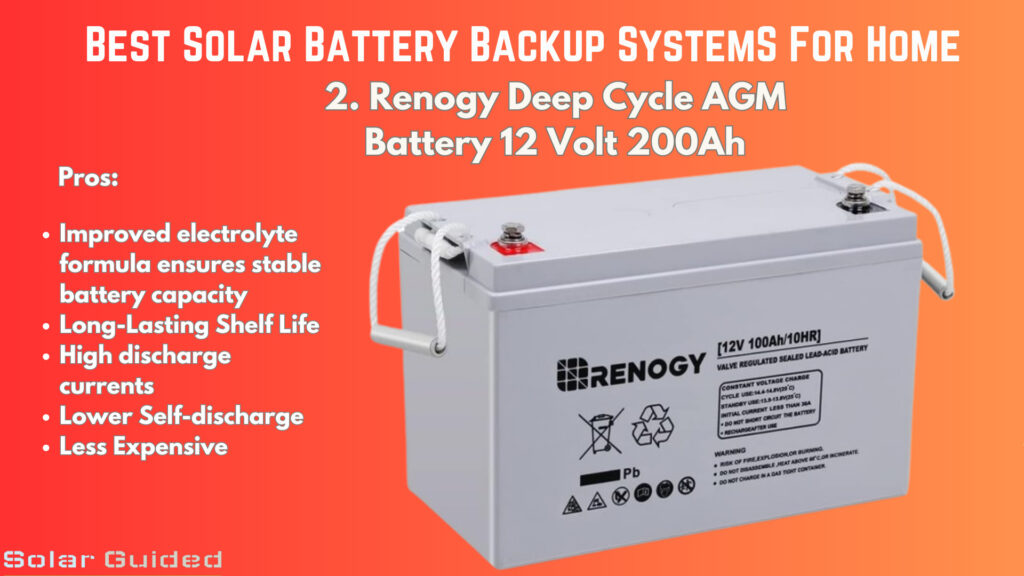
Renogy Deep Cycle AGM Battery 12 Volt 200Ah Review:
The Renogy 12V 200Ah Deep Cycle AGM Battery is a trustworthy and efficient power solution for various off-grid applications. This battery can be used for an RV, camping gear, a cabin, marine equipment, and off-grid systems.
If you’re on the lookout for a reliable power source to fuel your off-grid escapades, the Renogy Deep Cycle AGM Battery 12 Volt 200Ah is worth considering. It’s versatile enough to keep your RV, camping gear, cabin, marine vessels, or off-grid systems up and running smoothly.
Hassle-Free And Little Maintenance:
One of the best things about this battery is that it’s designed to be hassle-free. It has thick absorbent Glass Mat (AGM) separators and advanced valve-regulated technology, so you won’t have to deal with acid leakage and it will require little maintenance.
Impressive Discharge Performance:
What sets this battery apart is its excellent discharge performance. The special alloy plates and treated plate grids enable low internal resistance, allowing it to handle discharge currents up to 10 times its rated capacity. This reliability ensures a steady power supply for home appliances, making it a top choice for off-grid enthusiasts.
Long-Lasting Shelf Life:
It is composed of high-purity materials, and the Renogy Deep Cycle AGM Battery boasts an impressive shelf life. With a monthly self-discharge rate below 3% at 77℉ (25℃), it beats traditional flooded batteries by a whopping five times. This means you can count on it to be ready for action even after long periods of storage.
Adaptable in All Temperatures:
The improved electrolyte formula has high cold tolerance, and ensures stable battery capacity and top-notch discharge performance, even in chilly temperatures below 32℉ (0℃). This Renogy Deep Cycle AGM Battery will provide you with constant power, no matter how the weather is.
Cycle Service Length and Installation Tips:
It’s important to note that factors like discharge depth, ambient temperature, discharge rate, and charging methods affect the battery’s cycle service length. I will recommend installing it upright for optimal performance, but you can install it on its side under special circumstances. Just don’t turn it upside down—Renogy strongly advises against that.
Reference Capacity:
For the tech-savvy, the reference capacity specifications are pretty impressive, showcasing solid values across various discharge rates (C3: 152.9Ah, C5: 172.3Ah, C10: 190.5Ah, C20: 200Ah).
Final Review:
I will recommend the Renogy Deep Cycle AGM Battery 12 Volt 200Ah because it offers a combination of durability, reliability, and low maintenance. Its outstanding discharge performance, long shelf life, and wide operating temperature range make it a versatile and trustworthy power solution. The Renogy Deep Cycle AGM Battery 12 Volt 200Ah is a reliable and efficient power source, offering several compelling features.
Renogy Deep Cycle AGM Battery 12 Volt 200Ah
Brand : Renogy
Battery Cell Composition : Lead-Acid, AGM
Unit Count: 1.0 Count
Voltage: 12 Volts (DC)
Reusability:Rechargeable
The Pros:
- High discharge currents of up to 10 times the battery rated capacity.
- Self-discharge rate is 5 times lower than flooded counterparts, contributing to a longer shelf life.
- Made of high purity materials, reducing the monthly self-discharge rate to below 3% at 77℉ (25℃)
- Improved electrolyte formula ensures stable battery capacity
- outstanding discharge performance at low temperatures below 32℉ (0℃).
- Multiple Reference Capacities
- Recommended for upright installation, but allows for side installation under special circumstances.
- Great cold tolerance
The Cons:
- The battery is highly recommended to be installed upright, limiting flexibility in mounting options.
- While suitable for various applications, certain specific use cases might require alternative battery technologies based on unique requirements.
- Heavy weight
- Not more durable than lithium batteries
3. SolarEdge Home Battery 400V:
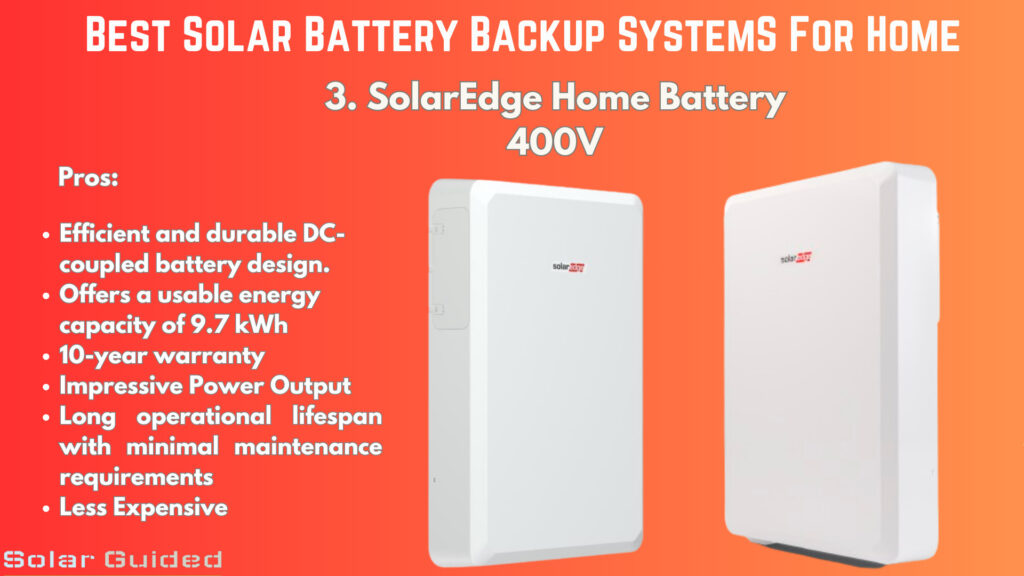
SolarEdge Home Battery 400V Review:
The SolarEdge Home Battery 400V is efficient, durable, and has excellent availability. This DC-coupled battery seamlessly integrates into solar power setups, providing homeowners with a reliable and hassle-free way to manage their energy needs. The features that make the SolarEdge Home Battery 400V a top choice for those looking to enhance their home’s energy capabilities are given below:
Efficiency and Durability:
The SolarEdge Home Battery 400V doesn’t just store energy, it does so efficiently. It maximizes the use of your generated solar power, ensuring that you get the most out of every ray of sunlight. The durability factor is equally impressive, offering homeowners peace of mind with long operational life and fewer maintenance requirements
Warranty Assurance:
SolarEdge Home Battery 400V has a 10-year warranty which offers a safety net for your investment. This warranty reflects the manufacturer’s confidence in the battery’s durability and performance, ensuring that homeowners can rely on its consistent performance.
Impressive Power Output:
SolarEdge Home Battery 400VSolarEdge Home Battery 400V has a maximum output of 30.9kW which is much enough. Now it is easy to handle peak energy demands, it provides a robust and reliable source of electricity when you need it the most, especially during high-demand periods.
Continuous Power Delivery:
SolarEdge Home Battery 400V has a continuous power output of 5 kW which is another standout feature. This provides constant energy for your home appliances.
Final Review:
SolarEdge Home Battery 400V is a DC-coupled battery, I will recommend this SolarEdge Home Battery 400V because it is efficient, durable, and has excellent availability. It can run for many years with no or little maintenance. The usable liveliness capacity of SolarEdge Home Battery 400V is 9.7 kWh. SolarEdge Home Battery 400V has a 10-year warranty. It has a maximum output of 30.9kW and comes with a continuous power output of 5 kW.
SolarEdge Home Battery 400V
Brand : Solaregde
Battery Cell Composition : lithium-ion
Numbers of cells : 30S1P cells
Voltage: 400V
The Pros:
- Efficient and durable DC-coupled battery design.
- Long operational lifespan with minimal maintenance requirements.
- Offers a usable energy capacity of 9.7 kWh, providing a reliable power source
- Maximum output of 30.9 kW and a continuous power output of 5 kW, suitable for various energy demands.
- Designed for excellent availability, capable of running for many years with consistent performance.
The Cons:
- Limited warranty for 10 year
- DC-coupled systems may require professional installation, potentially adding to the overall system cost
- it might be insufficient for larger residential or commercial energy storage needs.
- Integration and compatibility may be optimized within the SolarEdge ecosystem, potentially limiting flexibility for users with different solar setups.
- The efficiency, warranty, and features may come with a higher initial cost compared to some other battery options.
4. Tesla Solar Battery Backup System:
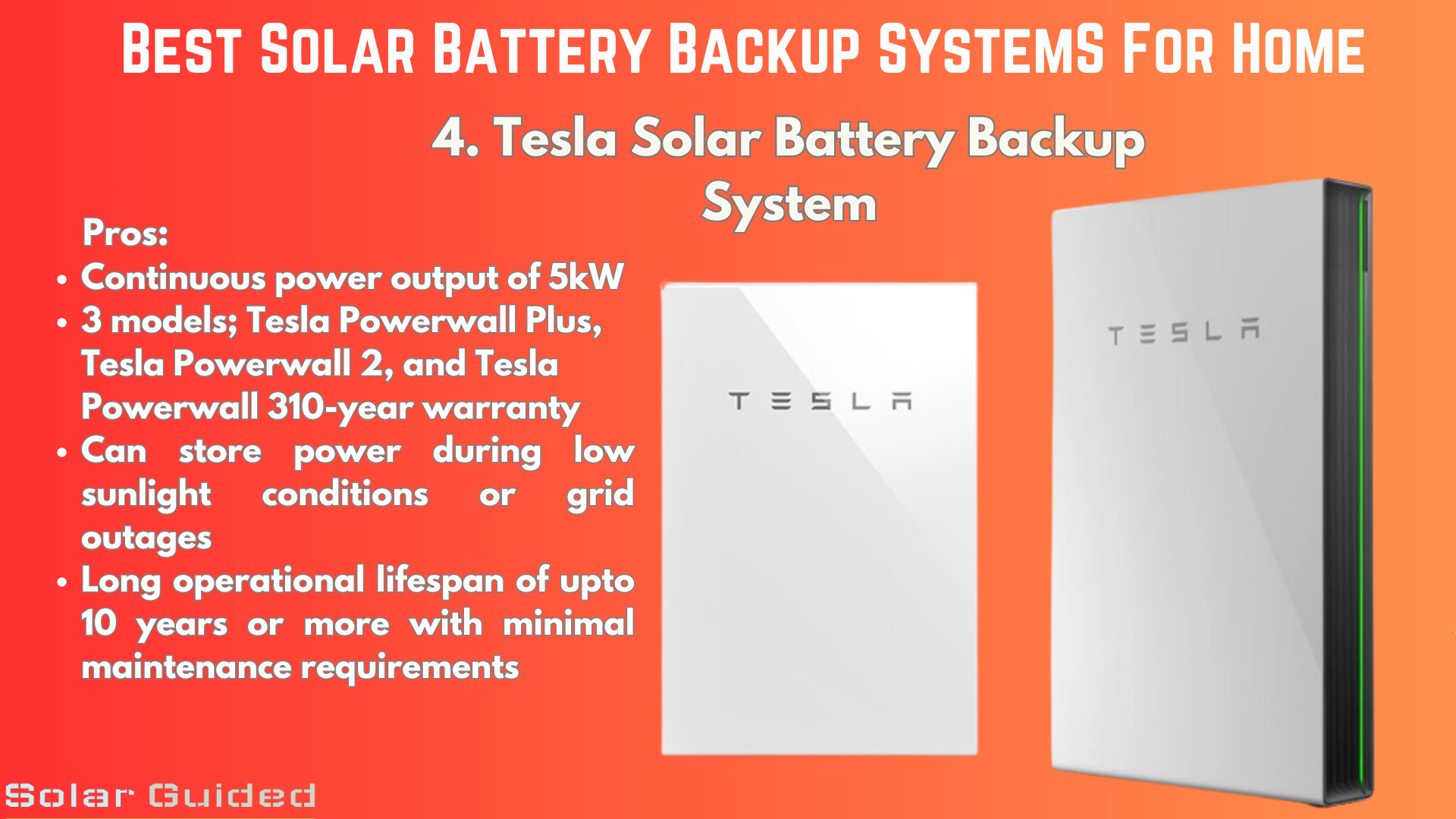
Tesla Solar Battery Backup System Review:
Tesla Powerwall is an AC-coupled battery. Although its availability is not very good but not its performance, It can run for more than 10 years with no or little maintenance, the power output is fine, and its usable capacity is 13.4 kWh. There are three models of Tesla PowerWall Tesla PowerWall Plus, Tesla PowerWall 2, and Tesla PowerWall 3. The main difference between these three models is the increase the their continuous maximum power. It has a continuous power output of 5kW.
The Tesla Solar Battery Backup System is powered by the renowned Tesla Powerwall and presents an intriguing option for those keen on harnessing the sun’s power. It is an AC-coupled battery and availability might be very good, the system’s durability, power output, and impressive usable capacity make a strong case for those looking to venture into solar energy.
Built to Last Over a Decade:
One of the most compelling aspects of the Tesla Solar Battery Backup System is its longevity. It is designed to run efficiently for over 10 years with minimal upkeep, it reflects Tesla’s dedication to providing a reliable and enduring energy storage solution. Homeowners can take comfort in knowing that their investment will continue to support their sustainable energy goals well into the future.
Powerful Performance for Everyday Life:
The Tesla Powerwall’s performance is impressive, effortlessly meeting the energy needs of modern households. With a continuous power output of 5 kW, it ensures a steady and reliable energy supply for essential home appliances. This feature guarantees a seamless daily routine, even during periods of peak energy usage.
Options to Suit Your Needs
The Tesla Powerwall lineup includes three distinct models – Tesla Powerwall Plus, Tesla Powerwall 2, and Tesla Powerwall 3. The key difference lies in the continuous maximum power output, showcasing Tesla’s commitment to innovation. Homeowners can choose the model that best aligns with their unique energy requirements, providing a personalized approach to solar energy storage.
Ample Capacity for Sustainable Living:
With a generous usable capacity of 13.4 kWh, the Tesla Solar Battery Backup System offers substantial storage for solar energy. This capacity empowers homeowners to tap into stored power during low sunlight conditions or grid outages, providing a reliable and sustainable energy source that enhances overall energy independence.
Final Review:
In summary, the Tesla Solar Battery Backup System, featuring the Powerwall, emerges as a significant player in the realm of solar energy storage. While availability considerations may come into play, its enduring lifespan, robust performance, and flexible model options position it as a compelling choice for those seeking a dependable and sustainable energy solution. As solar technology advances, the Tesla Solar Battery Backup System stands at the forefront of clean and efficient power options for homes.
Tesla Solar Battery Backup System
Brand : Tesla
Battery Cell Composition : lithium-ion
Capacity: 13.5 kWh
Voltage: 400–450 V
The Pros:
- Provides a steady 5 kW continuous power supply.
- Offers a substantial 13.4 kWh storage for solar energy.
- Designed to run efficiently for over 10 years.
- Different models cater to varied energy needs.
- Comes with a 10-year warranty.
The Cons:
- The 10-year warranty may be perceived as limited.
- Requires professional setup, potentially adding to costs.
- Availability may vary by location.
- Optimized within the Tesla ecosystem.
- May have a higher initial cost compared to some alternatives.
5. EP Cube Solar battery backup system:
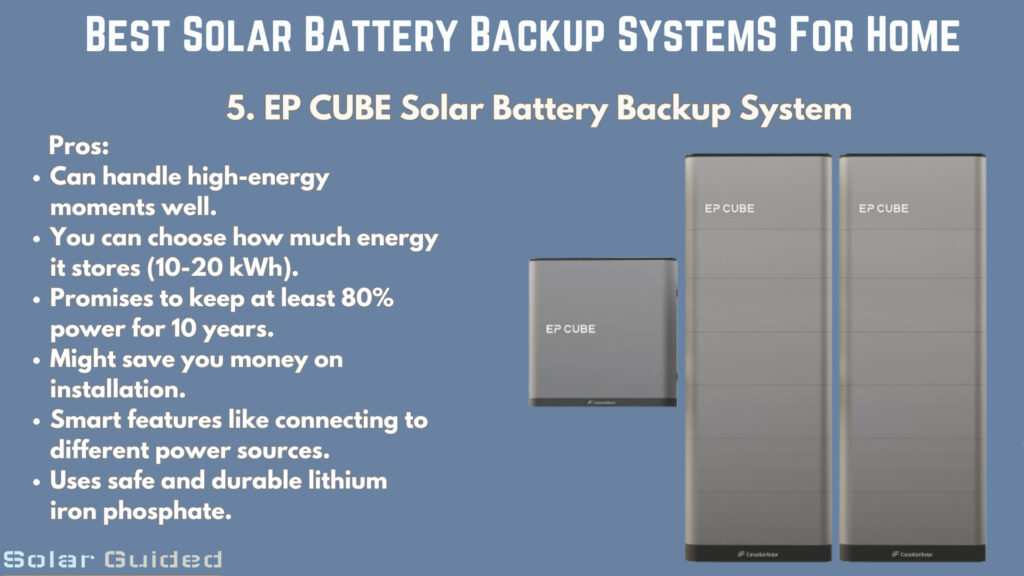
Solar EP Cube Battery Review:
When it comes to keeping your home powered up, the Canadian Solar EP Cube is a smart choice. This review breaks down what makes the EP Cube special and why it might be better than other options like the Tesla Powerwall 2.
Easy Power Management:
The EP Cube can handle power needs really well. It can keep a steady flow of 7.6 kilowatts and can even give a boost up to 11.4 kilowatts when you need more power. This makes it great for handling high-energy moments, making it a reliable backup during busy times.
Flexible Storage Options:
What’s cool about the EP Cube is that you can decide how much energy it stores. It can store anywhere from 10 to 20 kilowatt-hours in each unit. So, if you just need a little backup power or want to go all out, the EP Cube can handle it.
Long-Lasting and Warranty Promise:
The EP Cube comes with a 10-year promise. It says it will keep at least 80% of its power after 10 years. That’s pretty good! Plus, it uses something called lithium iron phosphate, which makes it tough and sturdy, promising a long and reliable life.
Installation Made Easier:
Getting the EP Cube set up isn’t a headache. While the cost might vary depending on where you are, the EP Cube can save you money on installation. It has a built-in inverter that makes things simpler, potentially saving you time and money compared to other options.
Special Features That Stand Out:
The EP Cube has some cool features that make it stand out. It can connect to different power sources easily, and it even has smart circuits that help manage energy use. Also, it can work with a generator if you have one. The EP Cube uses a type of battery chemistry called lithium iron phosphate, which is safer and more durable. That’s a big plus!
Final Thoughts:
If you want a reliable and user-friendly energy storage solution, the Canadian Solar EP Cube is worth considering. With its adjustable power, durability paromise, and special features, it brings a fresh approach to keeping your home powered up. It’s a choice that makes energy independence simple and accessible for everyone.
| Number of Modules | Capacity | Output (PV and Battery) Full Sun (Off Grid) | Output Battery Only No Sun (Off Grid) | Efficiency |
|---|---|---|---|---|
| 3 | 9.9 kWh | 7.6 kW | 5 kW | 93.93% |
| 4 | 13.3 kWh | 7.6 kW | 6.5 kW | 93.93% |
| 5 | 16.6 kWh | 7.6 kW | 7.6 kW | 93.93% |
| 6 | 19.9 kWh | 7.6 kW | 7.6 kW | 93.93% |
EP Cube Solar battery backup system
Brand : EP Cube
Battery Cell Composition : lithium iron phosphate
Capacity:6.6 kWh to 19.9 kWh
Voltage: 1000V
The Pros:
- Can handle high-energy moments well.
- You can choose how much energy it stores (10-20 kWh).
- Promises to keep at least 80% power for 10 years.
- Might save you money on installation.
- Smart features like connecting to different power sources.
- Uses safe and durable lithium iron phosphate.
The Cons:
- Availability info might be limited in some places.
- It’s a newer option compared to others in the market.
CONCLUSION:
Choosing the right solar battery backup system for your home is like finding the perfect energy companion. There are different options out there, each with its strengths.
Imagine the Tesla Powerwall as a reliable and powerful buddy. It’s good at providing a steady flow of energy, and it promises to stick around for a long time. Then there’s the SolarEdge Home Battery 400V, which is like the efficiency expert. It makes sure you get the most out of your solar power, keeping your home running smoothly.
For those who want something flexible and easy to manage, the Canadian Solar EP Cube is a great pick. You can decide how much energy it stores, making it customizable for your needs. It also comes with cool features, making it a smart choice.
If you’re on a budget or have a smaller home, the Renogy Deep Cycle AGM Battery and ECO-WORTHY 12V 280Ah LiFePO4 Lithium Battery are like affordable buddies. They might not have all the fancy features, but they get the job done for smaller setups.
In the end, the best solar battery backup system depends on what you need. Whether it’s power output, storage capacity, or just simplicity, there’s a buddy out there for you. And as technology keeps getting better, more options will likely pop up, making it even easier for homes to go green and save on energy bills.




